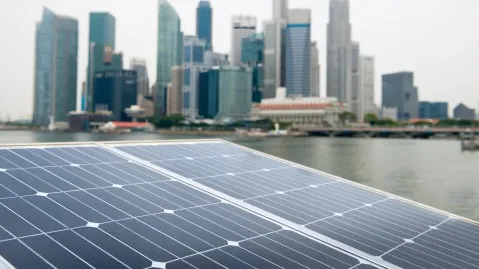
Pressure from government is the top reason for RE investments
About 44.6% of surveyed firms in Asia said so.
Increased pressure from the governments and investors were compelling companies in Asia to set targets in reducing carbon emissions, according to Black & Veatch.
In the survey conducted with media company Eco-Business, 44.6% cited increased pressure/influence from the government as the leading factors driving investments in renewable energy, followed by increased shareholder pressure and drive for sustainability goals at 42.9%.
Lower levelised cost of energy is also a factor for renewable energy investments at 39.3%, and increased demand from commercial and industrial customers at 33.9%.
“Investors and asset managers also are looking for transparency and better disclosure about how large a company’s carbon footprint really is,” Eco-Business Assistant Editor Gillian Parker said in Black & Veatch’s 2022 Asia Electric Report.
Other factors that drive renewable investment were attractive government incentives and/or policies (32.1%), fewer financing options for traditional solutions or easier to finance renewables (28.6%), improved competitiveness and efficiencies from new technologies (23.2%), and lower development risks and risks of delays compared to traditional solutions (16.1%).
Convenience and lower risk of using power purchase agreements to source new renewable projects (14.3%), increased demand from residential customers (8.9%), and battery storage making it easier to manage and reduce losses (8.9%), were also amongst the factors.
Parker also said that there is an increasing focus on Scope 3 emissions or the indirect emissions occurring in a company’s value chain, which is “likely to see large energy consumers press providers to drive down their emissions.”
According to the survey, 80% cited Scope-1 emissions or what their company’s facilities, plants, and vehicles directly emit as the top element that is being included in the carbon reduction and renewable goals.
Scope 2 or indirect emissions from energy purchase came second with 53.3%, followed by Scope 3 at 50%.
However, many companies lack a strategic roadmap to achieve their decarbonisation goals despite making pledges. A total of 41.9% said they do not have a roadmap, 35.5% said they have a roadmap for the next five years, 16.1% have for the next 10 years, and 9.7% have a roadmap for beyond 10 years.
“This roadmap blind-spot is perhaps symptomatic of a region still figuring out how to wean itself off fossil fuels. For some companies operating in fossil-fuel dependent countries, the challenges seem insurmountable,” Parker said.
A total of 33 commercial and industrial electricity customers in Asia took part in the survey, according to the report.








![Cross Domain [Manu + SBR + ABF + ABR + FMCG + HBR + ]](https://cmg-qa.s3.ap-southeast-1.amazonaws.com/s3fs-public/styles/exclusive_featured_article/public/2025-01/earth-3537401_1920_4.jpg.webp?itok=WaRpTJwE)
![Cross Domain [SBR + ABR]](https://cmg-qa.s3.ap-southeast-1.amazonaws.com/s3fs-public/styles/exclusive_featured_article/public/2025-01/pexels-jahoo-867092-2_1.jpg.webp?itok=o7MUL1oO)









 Advertise
Advertise


